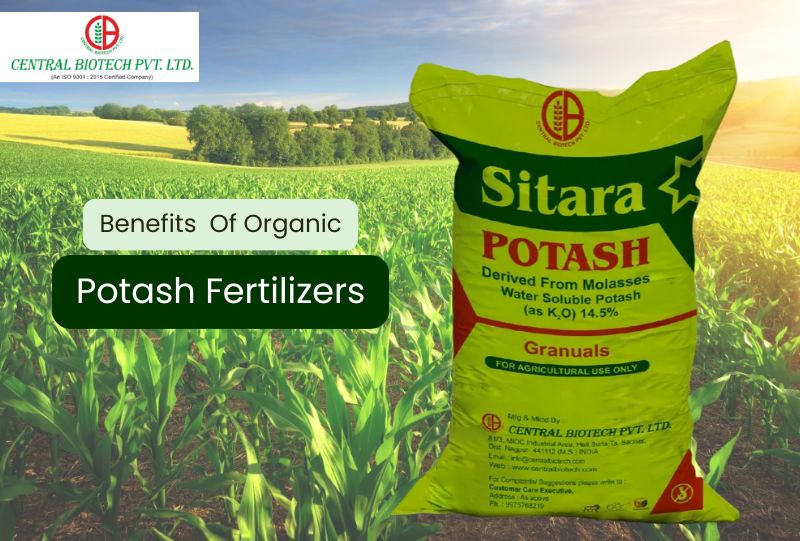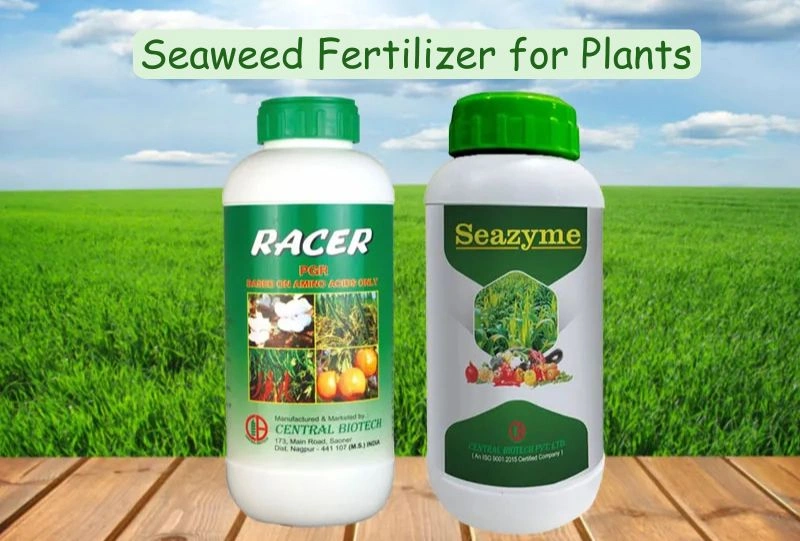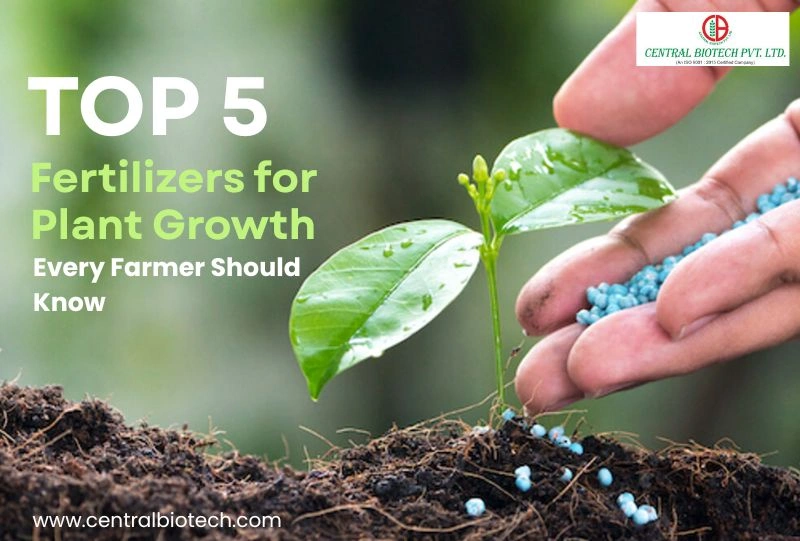Organic potash fertilizers are naturally prepared eco-friendly potassium-rich regiments that enhance crop health and productivity. Potassium is a macro element that plants require in higher quantities for chlorophyll generation and growth. However, potassium is barely available in natural soil, therefore using Organic Potash Fertilizer becomes important.
What Is Organic Potash Fertilzer?

Organic potash fertilizer is a natural potassium-rich soil amendment made from plant or mineral resources such as lumber ash, banana peels, or seaweed. It promotes plant development, strengthens roots, improves drought tolerance, and increases blooming and fruiting. It is free of chemicals, which promotes sustainable farming and increases soil fertility.
But except growth what are the other benefits of using Organic Potash Fertilizers and is that safe to use for crops? Let's find the answer in the following blog.
Benefits and Uses Of Organic Potash Fertilizers
1. Improved Photosynthesis In Plants
Organic potash fertilizer, particularly potash generated from molasses, is needed for photosynthesis, enzyme activation, and nutrient delivery. It strengthens plant movable partitions, allowing roots to grow deeper and increasing water absorption. When combined with phosphate-rich organic manure, it provides a balanced nutrition supply that promotes strong shoot growth. Vegetation becomes more resistant to stressors like drought and extreme temperatures.
Usage: Great for crops like tomatoes, potatoes, and peppers, where strong root systems and enhanced nutrient absorption lead to higher yields and healthier crops.
2. Provide Resistance Against Bacterial and Fungal Illness
A potassium-rich crop regimen allows vegetation to enhance the thickness of cell walls, reducing the chances of infections entering the plant. Potash derived from molasses improves the plant’s ability to withstand fungal illnesses by regulating moisture levels. When used with phosphate-rich organic manure, it strengthens the plant’s immune system, resisting unusual infections like powdery mould or root rot. This reduces the need for chemical pesticides.
Usage: Best ideal for vegetable gardens and fruit orchards, making sure an organic, disease-resistant crop with fewer pesticide applications.
3. Enhanced Water Retention In Soil
Potassium plays an important role in water retention, helping plants retain moisture properly. Potash generated from molasses helps flowers develop deep root systems, allowing them to reach subsurface water supplies. When combined with phosphate-rich organic manure, it improves soil structure and moisture retention, making plants more tolerant under dry conditions. Farmers in dry areas rely on this combination to keep crops productive even during periods of little rainfall.
Usage: Beneficial for drought-tolerant crops such as wheat, maize, and sugarcane, guaranteeing consistent yields even when water supply is variable.
4. Enhanced Flower and Fruit Growth
Potassium enhances flower and fruit growth by enhancing nutrient transport inside the plant. Potash generated from molasses provides essential minerals and promotes pigmentation, taste, and essence in the fruit. When combined with phosphate-rich natural manure, it provides a steady supply of phosphorus for roots and promotes growth. This combination extends fruit shelf life, lowers post-harvest losses, and boosts sugar content in the crop.
Usage: Excellent for flowering plants, fruit trees, and gardens, ensuring colorful blossoms and increased fruit supply, particularly for apples, mangoes, citrus, and berries.
5. Improves Soil Fertility
Unlike artificial fertilizers, potash fertilizer for plant growth obtained from molasses increases soil texture while without causing deterioration. It supports microbial activity by ensuring greater breakdown of organic matter and increasing nutritional availability. When combined with phosphate-rich organic manure, it restores soil pH and increases fertility. Over time, this minimizes nutrient depletion and preserves soil structure. It is essential for sustainable agricultural techniques. Healthy soil can hold moisture to resist erosion and ensure long-term productivity.
Usage: Suitable for all types of plants, maintaining an eco-friendly and regenerative approach to agriculture while also conserving soil health.
6. Environmentally Friendly and Sustainable
Potash made from molasses is free of artificial chemicals that may harm the environment. Unlike synthetic fertilizers, which may damage water resources, this natural opportunity is biodegradable and encourages biodiversity. When combined with phosphate-rich natural manure, it also improves soil quality without leaving detrimental residues. Additionally, it promotes the growth of beneficial bacteria and earthworms, which enhance soil aeration.
Usage: Suitable for natural farming, sustainable agriculture, and home gardening, offering a safer, chemical-free approach to plant vitamins.
7. Provide Essential Nutrients
Potassium aids flowers in absorbing essential vitamins such as nitrogen and phosphorus efficiently. Potash obtained from molasses ensures that plants have a consistent supply of potassium, and phosphate-rich organic manure provides phosphorus for root and flower development. This combination enhances nutrient absorption, which improves normal plant metabolism and productivity. It also increases leaf chlorophyll production, resulting in greener, healthier plants with higher photosynthetic efficiency.
Usage: Recommended for all crops, inclusive of leafy vegetables, grains, and root greens, making sure the most appropriate nutrition and higher resistance to environmental stresses.
Also read: Organic Potash vs Chemical Potash Fertilizers: What’s Better for Indian Farms?
Bottom Line
In summary, organic Potash Fertilizers can improve crop yield and enhance soil health by providing the required nutrients to the plant. Choosing the right fertilizer can not only enhance the product but also maintain the fertility of the soil. Select from our wide range of ISO-certified GMP-approved organic potash fertilizers to boost crop yield today.
FAQs
1. Are Central Biotech's Potash Fertilizers the same as other chemical fertilizers?
Absolutely not. Central Biotech's organic potash fertilizers are ISO and GMP-certified and serve natural growth for crops.
2. Can I mix organic potash fertilizers with others?
Sometimes mixing fertilizers can yield better results. However, mixing is necessary to follow the manufacturer's guidelines and advised ratios.
3. Are organic Potash Fertilizers suitable for all soil types?
Yes, Central Biotech's organic potash fertilizers are suitable for all soil types starting from clay to silt.
4. How frequently can I use organic potash fertilizers?
The ideal way is to use organic potash fertilizers 2-3 times every week. However, it depends on soil and crop type.
5. Is this fertilizer suitable for all types of garden flowers?
Yes, fertilizer for flowering plants is beneficial for a wide range of garden flowers, promoting healthy growth and vibrant blooms.








